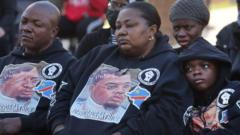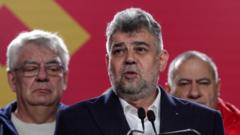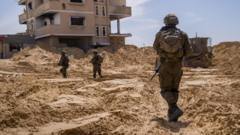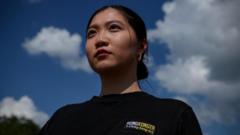Thousands take to the streets as tensions rise ahead of the Constitutional Court's pivotal ruling on Yoon Suk Yeol’s presidency.
Protests Intensify in South Korea as Court Decides President's Future

Protests Intensify in South Korea as Court Decides President's Future
Massive rallies erupt in Seoul as Yoon Suk Yeol's impeachment hangs in the balance, shaping the nation's democratic future.
South Korea is witnessing a dramatic increase in public unrest as supporters and opponents of President Yoon Suk Yeol rally outside the Constitutional Court in anticipation of a ruling that may determine the future of the country's leadership. This pivotal situation arises from Yoon's controversial attempt to enforce martial law, which has been perceived by his detractors as an act of "insurrection." Protests have surged as citizens demand the court either remove or reinstate Yoon, whose presidency has been marred by political strife since his failed martial law initiative on December 3.
The court's impending decision has raised tensions to unprecedented levels, and the fear of civil discord has prompted authorities to reinforce security measures around the courthouse. Approximately 14,000 police officers have been assigned to maintain order, and closures of schools, street vendors, and nearby landmarks are preparing for potential unrest. Additionally, precautions have led to a ban on drone flights in the area and requirements for gun owners to secure firearms at police stations.
As the court deliberates, a cloud of uncertainty envelops the nation, with speculation about the justices' internal divisions contributing to anxiety on all sides. Prominent South Korean journalist Cho Gab-je expressed that restoring Yoon to office could set a dangerous precedent, potentially empowering future leaders to impose similar authoritarian measures. With the fate of democracy hanging in the balance, many South Koreans are eager for a swift resolution to the ongoing political crisis.
The court's impending decision has raised tensions to unprecedented levels, and the fear of civil discord has prompted authorities to reinforce security measures around the courthouse. Approximately 14,000 police officers have been assigned to maintain order, and closures of schools, street vendors, and nearby landmarks are preparing for potential unrest. Additionally, precautions have led to a ban on drone flights in the area and requirements for gun owners to secure firearms at police stations.
As the court deliberates, a cloud of uncertainty envelops the nation, with speculation about the justices' internal divisions contributing to anxiety on all sides. Prominent South Korean journalist Cho Gab-je expressed that restoring Yoon to office could set a dangerous precedent, potentially empowering future leaders to impose similar authoritarian measures. With the fate of democracy hanging in the balance, many South Koreans are eager for a swift resolution to the ongoing political crisis.



















